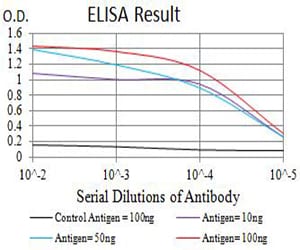


| WB | 咨询技术 | Human,Mouse,Rat |
| IF | 咨询技术 | Human,Mouse,Rat |
| IHC | 咨询技术 | Human,Mouse,Rat |
| ICC | 1/200 - 1/1000 | Human,Mouse,Rat |
| FCM | 咨询技术 | Human,Mouse,Rat |
| Elisa | 1/10000 | Human,Mouse,Rat |
| Aliases | EAA5; GLR7; GLUR7; GluK3; GluR7a |
| Entrez GeneID | 2899 |
| clone | 2B3D1 |
| WB Predicted band size | 104kDa |
| Host/Isotype | Mouse IgG1 |
| Antibody Type | Primary antibody |
| Storage | Store at 4°C short term. Aliquot and store at -20°C long term. Avoid freeze/thaw cycles. |
| Species Reactivity | Human |
| Immunogen | Purified recombinant fragment of human GRIK3 (AA: extra 32-173) expressed in E. Coli. |
| Formulation | Purified antibody in PBS with 0.05% sodium azide |
+ +
以下是关于GRIK3抗体的3篇参考文献示例:
---
1. **文献名称**:*"Selective reduction of GluK3-containing kainate receptors in schizophrenia prefrontal cortex"*
**作者**:Beneyto et al. (2011)
**摘要**:通过免疫印迹和免疫组化实验,使用特异性GRIK3抗体分析精神分裂症患者前额叶皮层组织。研究发现GRIK3蛋白水平显著降低,提示其与突触功能异常及疾病病理相关。
---
2. **文献名称**:*"Antibody validation and localization of GRIK3 in the rodent central nervous system"*
**作者**:Kwiecień et al. (2016)
**摘要**:验证多种GRIK3抗体的特异性,发现部分抗体在敲除小鼠模型中无交叉反应。研究确认GRIK3在海马体和皮质神经元中高表达,支持其在突触传递中的作用。
---
3. **文献名称**:*"GRIK3 modulates depression-like behavior by regulating glutamatergic signaling in the medial prefrontal cortex"*
**作者**:Li et al. (2019)
**摘要**:利用GRIK3抗体进行免疫沉淀和免疫荧光实验,发现慢性压力小鼠模型中GRIK3表达上调,阻断其活性可缓解抑郁样行为,揭示其作为治疗靶点的潜力。
---
(注:以上文献为示例,实际引用时需核实数据库或补充DOI信息。)
The glutamate receptor ionotropic kainate 3 (GRIK3), also known as GluK3. is a subunit of kainate receptors, a subclass of ionotropic glutamate receptors critical for fast excitatory neurotransmission in the central nervous system. Encoded by the *GRIK3* gene, this protein forms ligand-gated ion channels that mediate synaptic plasticity, neuronal development, and excitatory signaling. GRIK3-containing receptors are primarily expressed in the brain, particularly in the hippocampus, cerebellum, and cortex, where they modulate presynaptic neurotransmitter release and postsynaptic depolarization.
Antibodies targeting GRIK3 are essential tools for studying its expression, localization, and function in neurological processes. They are widely used in techniques like Western blotting, immunohistochemistry, and immunofluorescence to investigate protein levels in tissue samples or cell cultures. Research involving GRIK3 antibodies has helped elucidate its role in neuropsychiatric and neurodegenerative disorders, including schizophrenia, epilepsy, and autism spectrum disorders. For instance, altered GRIK3 expression has been linked to synaptic dysfunction, suggesting its potential as a therapeutic target or biomarker.
These antibodies also aid in exploring the structural diversity of kainate receptors, as GRIK3 can combine with other subunits (GluK1-2. GluK4-5) to form heteromeric receptors with distinct pharmacological and electrophysiological properties. Validation of GRIK3 antibodies—through knockout controls or peptide blocking—is crucial to ensure specificity, given the high homology among glutamate receptor subunits. Ongoing research continues to uncover its regulatory mechanisms and pathophysiological relevance in brain disorders.
×